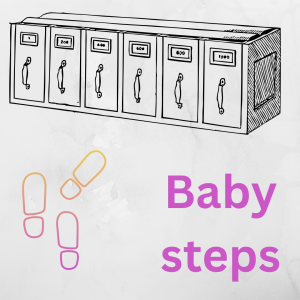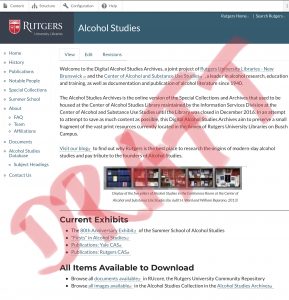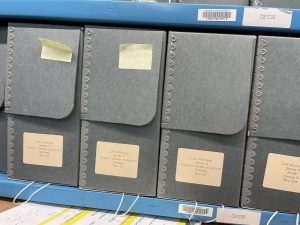 The first month of the project flew by incredibly fast – while moving forward with baby steps. Exactly how it should happen in the initial phase, when planning and experimenting should still be more important than ramping up production.
The first month of the project flew by incredibly fast – while moving forward with baby steps. Exactly how it should happen in the initial phase, when planning and experimenting should still be more important than ramping up production.
I successfully reacquainted myself with the various formats of the Alcohol Archives:
- print resources in my secret stash of photocopies, printouts, discarded duplicates, and parts of the actual collection in Annex on the Busch Campus
- digital formats such as pdf, jpg, tiff, mp3, mp4, doc, xls, etc.
- documentation related to both, old and newish.
Before reaching out to meet with others, I also refreshed my memory related to digital library technologies working a bit on all the platforms to be used:
- RUcore with its intricate Workflow Management System
- Omeka on the Rutgers-hosted platform
- the latest iteration of Drupal customizes for Rutgers University Libraries
- the current site, the Rutgers-based WordPress
Reconnecting with everyone involved in the project one way or another gave me a peace of mind. It’s reassuring that the project is well supported by experts in each area I need anything, from assistance to inspiration, or anybody if I want to bounce off ideas. It always reminds me how I miss the Alcohol Library, where all this was just routine, another day in the office.
Accomplishments
- Starting small, I was able to add content to each platform, still in pilot-mode amounts. IIS staff had set up the Drupal dev site for the Alcohol Archives by extending the existing Alcohol Studies Database pages with the digital archives. Looking over the pages that mirror the structure of this WordPress site inspired me to experiment. It means that I had to add a few items, representative of the collection to the other platforms to be able to link content, either an exact source file or URL directly or a canned search.
- To better document the process, I consolidated the upload tracking system into four spreadsheets, based on the subcollections. It assures that correct subjects are assigned, keeps track of work done with sublocations, and eliminates duplicates and other errors.
New discoveries
 Drupal presented a few surprises. However, we worked out solutions for all errors and problems I ran into during this pilot phase (e.g., autocompleting internal links, generating automatic URL alias to link media files, customizing captions, and adding block quotes with margins).
Drupal presented a few surprises. However, we worked out solutions for all errors and problems I ran into during this pilot phase (e.g., autocompleting internal links, generating automatic URL alias to link media files, customizing captions, and adding block quotes with margins).- The public facing Drupal site will have a search interface limiting RUcore searches to the Alcohol Collection only. This helps with establishing subjects and alternative titles to bundle items in the four subcollections: Publications, Notable People, Summer School, and Special Collection.
- When I accidentally created a duplicate record, I had to look up the statistics of the original from 2021. It had 42 downloads! I couldn’t help checking some other items: most of them had been downloaded several times, anywhere between 4 and 44. It means our content was discovered without any publicity or link!
Concerns
This is not new: I am not sure about the future access of the original documents in the Alcohol Archives currently hosted in Annex. The current and previous staff have been extremely helpful locating the boxes, communicating changes, keeping track of my work, and assisting my research and digitization. However, the decision to close the Alcohol Library came out of the blue in 2016, the move was rushed, and suspending operations did not help preservation. We were in the middle of a large digitization project, which included archival processing. I recognize sticky notes with my handwriting as a reminder, reference, or instructions what to do. Time stands still.
 To do
To do
Print material in Annex
- assess conditions of print, find out if rehousing possible
- correct location codes where applicable
- continue to analyze content of boxes with unfinished processing
- review and update xls from 2021, which assessed items for batching, bundling, and delegating
- create/modify templates to meet the needs of above bundles
- assign work to grad student after setting up bundles, templates, and completing training
- pilot workflow for various scenarios: single items, similar files, docs, images, periodical – how to automate
Takeaway: Easy does it
Statistics
Number of files uploaded so far
- Omeka: 77 files
- RUcore: 110 pdfs
Pages and posts created so far
- Drupal: 22 pages, 32 media items
- WordPress: 49 pages, 58 posts, 333 images